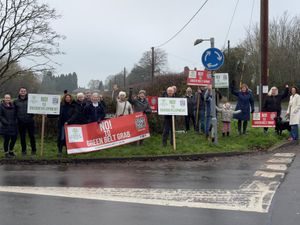Foster care recruitment bucking trend
More people are becoming foster carers in Telford & Wrekin than leaving the system year on year, bucking the trend nationally.
There are currently 173 approved foster care households in the borough and 183 children placed with carers.
However, the authority have 20 vacancies and are continuing their search for more foster carers.
Darren Knibbs, director of children’s safeguarding and family support, was joined by Kelly Burgess, service delivery manager for fostering, adoption and performance, for a presentation to councillors on Wednesday night.
Mrs Burgess stated that nationally the Fostering Network estimates that 7,200 foster families are needed in the next 12 months.
“Local authorities are experiencing a reduction in approved foster carers, with more leavers than the number of joiners in 2022-23, reduced placement sufficiency and choice means more children are at risk of not being placed in settings most suited to their needs,” said Mrs Burgess in her presentation to the children and young people’s scrutiny committee.
“I’m pleased to say that we are bucking the trend. Telford and Wrekin has generally experienced a year-on-year net increase in capacity.”
She added that the council’s fostering service has performed ‘above’ most of their statistical neighbours in the number of applications completed and approved in 2022/23.
Between April 2022 and March 2023 there were 25 applications from prospective fostering households and 15 approvals.
Mrs Burgess added that a key priority for the service is to increase foster care capacity through a focus on recruitment and retention to ‘enable more Telford and Wrekin children who are looked after to stat local’.
The service also wants to ‘maximise the utilisation’ of their capacity to prevent external and residential placements were possible.
Since April 2023, 37 teenagers have come into care in Telford & Wrekin, with 21 being placed internally, nine placed in external fostering and seven in residential placements.
Mrs Burgess said that the number of external fostering placements has come down, but they want to reduce that further.
She added that they have started to see more relatives or friends come through the fostering application and they are looking to increase that to allow children to continue living with families.
The council departments are currently looking at ‘innovative’ ways in which they can support carers to continue looking after children in family settings.
A new foster carer support model is being created to form informal networks with peers which will spread across 13 localities and supported by fostering social workers.
Mrs Burgess says that this will help with overnight stays so children can go to a family they already know through the support group.
Feedback results showed that 85 per cent of respondents were ‘satisfied with their fostering social worker’. However, 53 per cent of carers felt ‘support and services available did not match their expectations’.
Councillors were told that the service are ‘taking on the feedback and looking to enhance the service to plug those gaps’.
Mrs Burgess said that retention rates are ‘very good’ and that they looked at patterns about why foster carers exit the service. She said that recent exits were due to retirement, changing career paths or taking over the guardianship of children.
She added that exit interviews were treated as a ‘learning’ opportunity and they continue to monitor them.
Responding to the presentation councillor Jenny Urey said that was ‘obvious’ that areas were progressing.
She suggested that more ‘in your face’ information-based advertising is used on billboards in prominent location in a bid to appeal for more foster carers.
Mrs Burgess said that the ‘best’ recruitment tool was word of mouth and that they offered a referral reward scheme to current foster carers.
Councillor Kim Tonks added that ‘a lot of people’ foster through private companies as pay can be higher. However, she highlighted the council’s training programme and ‘wide ranging support’.
Mr Knibbs replied that previously people had transferred to external companies for fostering, but now people are ‘coming back’ due to their support offer.
Committee chair Janice Jones added that she had also seen an improvement in the service.





